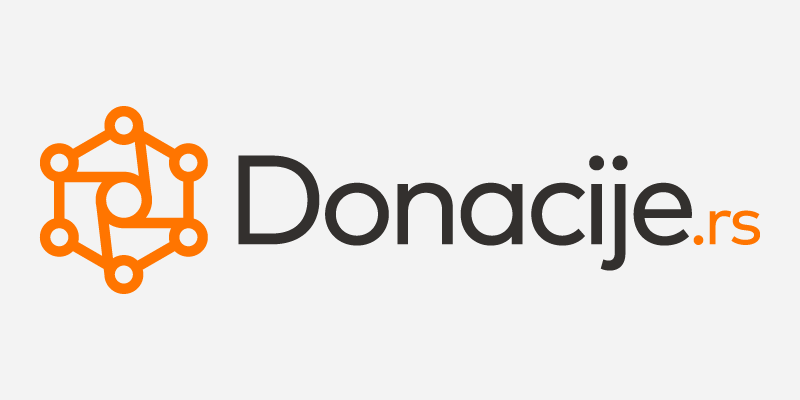The nonprofit sector in the Western Balkans is facing great challenges. A big change is underway - foreign donors, on which the entire sector used to rely, are leaving the region and going where their help is needed more. That creates new problems, and not only in the fundraising sphere.
Want to organize an activity in the local community, but there are no open calls at the moment? You’re organizing an event for the what seems like the millionth time, but you still have a feeling like you’re doing it in a tearing hurry due to limited resources? You received an application for your workshop, but you can’t remember if the applicant is your alumnus, volunteer or a donor?
The job of nonprofits is far from simple. Without money and better organization, their programs are at stake, getting help to final beneficiaries is more difficult, and their work has less of an impact.
What can we do to adjust to the new circumstances and empower the non-profit sector to reach its full potential in the 21st century?
New technologies aren’t just for businesses to use. Globally, 67% of nonprofits accept online donations. Many nonprofit campaigns have succeeded thanks to crowdfunding platforms. As many as 98% of the organisations that have used a fundraising or CRM software say that it has had a positive impact on their work. You can find more on how nonprofits worldwide use new technologies in this report.
Nonprofits in Serbia use technologies in their work too, but on a pretty basic level. Most often, this involves endless, hard-to-look-through Excel spreadsheets with all contacts and participant lists from different events, a Gmail account, and probably a Facebook page. Many organizations also use Google Drive and Dropbox to collaborate and store documents, while only a fraction of nonprofits use Mailchimp and similar mailing services.
It is time for the next step.
Catalyst Balkans has developed 3 online tools for non-profit organizations to make fundraising, decision-making, planning and community engagement easier.
Whether you’re a large organization with many employees and a significant budget, or you are voluntarily organizing local campaigns, these tools will improve your work, and help you be more efficient and raise more funds.
Data empowering social good - Giving Balkans
Giving Balkans is a database and an app that gives you a bigger picture of donations in the Western Balkans. Practically, it’s business intelligence, just for philanthropy, and all the data is presented in simple and interactive visualizations.
Since its founding in 2013, Catalyst Balkans has been tracking and recording all philanthropic giving in the countries of the region - Serbia, Croatia, BiH, Montenegro, Kosovo, Albania and Macedonia. In countries around the world where this data is open, donations are easily tracked through publicly available financial reports, so that organizations like Catalyst automatize the collection and analysis process. In the Balkans, this is not possible..at least not until the national business registries improve the quality of their data and make it available in an open, machine-readable format.
Instead of that - we are creating an independent alternative. Giving Balkans is a contribution to the self-regulation of the nonprofit sector and to an increase in trust levels between donors and nonprofits. To do this, we carefully monitor press clipping in the entire region and directly contact nonprofits and donors, and based on those inputs, we build our database.
Since it is impossible for the media to track all giving, this methodology has its limits, but at the moment it is the only relevant indicator, based on which we make annual reports with estimated total values.
In the Giving Balkans app, you’ll find answers to the questions of who donates, to whom, how much, why, where and when donations happen. By publishing this data, we want to create an open philanthropic community in the region and build trust among everyone involved.
In order to access the app, you need to register. You can do that as an individual or organization. The basic level access is free for everyone.
After registering, the app will automatically open, with an instruction manual on how to use it. It is that simple.
On the left side menu, you’ll find 7 tabs:
- Database contains basic data about the Giving Balkans and an instruction manual,
- Scope is a general overview on the giving in each country between January 2015 and today, and it is the first filter in which you choose the country and year,
- Donors is a filter that you will use to select the type of donor and type of donation,
- Beneficiaries lets you select the type of beneficiary,
- in the Donations tab you can select the donation cause that you are interested in,
- Details filters the municipalities and lets you export the data in a machine-readable format,
- and the CiviGraph is one of the most interesting features that uses network analysis to show the direct relations between donors and beneficiaries.
How to use Giving Balkans to its full potential?
Let’s say that we’re an association that deals with the accessibility issues in Bačka Palanka (Serbia) and that we’re looking for a donation from a company for our project.
When we log in and access the app, under the Scope tab, we’ll choose all 3 years (2015-2017) as the desired timespan, as we are interested in the entire period. Under the Donors tab, we will choose companies as donors (Corporate), and for now we can skip the Donation use and Diaspora tabs. In the Beneficiaries tab we will select only nonprofits as the recipients. Since we are looking to find a donor in the field of accessibility, as the donation purpose we will select Support to marginalized groups. The only thing left to do now is selecting Bačka Palanka as the chosen municipality under the last tab (Details), and automatically we’ll get a spreadsheet showing the list of companies that have, in the past 3 years, donated to nonprofits in Bačka Palanka that support marginalized groups. Also, it might be useful to check out the results for neighboring towns as well.
If we want, in the next step we can select some of those companies and see its other connections - to which other organizations it has also donated.
This way we make visible the good done by donors and nonprofits, and then you can multiply that good with your work.
Whether you’re an association looking for new donors, a company developing its CSR strategy or a journalist writing about philanthropy - with Giving Balkans you’ll have a better understanding of the state of philanthropy in the Balkans, and you’ll make better decisions and plans for your organization.
Right now the database contains the data from Serbia, and by the end of the year it will be updated with data from Kosovo and Albania. In the beginning of 2018, we will publish the data for Croatia, BiH, Montenegro and Macedonia as well.
At this moment, all content is available in English and Serbian. By the end of the year it will be translated into Albanian, and into other languages of the region in the beginning of 2018.
No more endless spreadsheets and boring emails - CiviCatalyst
CiviCatalyst is a CRM platform for nonprofits in Serbian language, that makes contact management, organizing events and sending newsletters easier.
Errrm, a CRM platform?
You know how when you call the customer service of your mobile operator to complain about your bill again being higher than it should be, whoever answers the phone knows all the information about you and your interactions with their company - when is the last time you called, how long you’ve been their client, how much you spend on data etc? That is possible because they keep all that data in one spot called a customer relationship management software, also known as CRM.
In the nonprofit world, this software is called constituent relationship management and is used to build stronger relationships with your community, final beneficiaries and donors. The most famous and most flexible open source CRM for nonprofits is CiviCRM, which is also the base of CiviCatalyst.
CiviCatalyst makes it possible to keep all your data in one safe and easily searchable space, instead of in numerous messy Excel spreadsheets or worse - in various folders and binders.
Actually, CiviCatalyst offers much more than that - it replaces other tools that you are most likely using, or were thinking of using in your organization.
Not only will you keep all the data about the contacts that matter to you more easily, you will also be able to communicate with them by creating mailing groups and sending them newsletters regularly. Practically, it offers the features of Mailchimp, in Serbian, alongside with other features of CiviCatalyst.
Moreover, CiviCatalyst’s mailing is the favorite feature of us at Catalyst. With it you can easily design a modern newsletter and keep track of who opened it, on what links they clicked and so on. When we switched to it from our old newsletter, the change was very well received from our readers.
Another particularly important feature is event management and registration. As simple as creating a Facebook event, you can make one in CiviCatalyst. If registration is mandatory, instead of combining Facebook and Google Forms, you can do it all in CiviCatalyst and in the end quickly send a link for the event and registration form to your mailing list. That way, you can always have a precise overview of which of your donors attended which event.
Aside from these features, you can also manage members, keep a record of membership fees, keep track of the frequency and amounts of donations, organize your volunteers etc.
You can check that in our explainer video or our instructional video (both in Serbian).
“The features are great, but it all takes a lot of resources and time, and right now we are in a hurry and not ready to implement such a solution”, some might say.
Yes, nobody has enough time and everyone is in a hurry. So was Catalyst 2 years ago when we started using CiviCRM. With only a few people at the office and A LOT of work. Then, we witnessed all of its possibilities, we started upgrading it and adjusting to the local needs and 2 years later - we have CiviCatalyst: a simple tool in our own language, which is a part of all our processes today.
Regardless of their size - whether they are small or big - all organizations have great and long-term benefits from using a CRM and precisely tracking interactions with everyone involved - the donors, beneficiaries, alumni, volunteers, community. That’s why 98% of nonprofits around the world say that using a CRM software has significantly improved their work.
After all, the holiday season is probably the best time to start preparing to implement such a solution. Make it your New Year’s resolution - let your organization enter 2018 better organized and technologically savvy.
CiviCatalyst is currently available to users from Serbia, but in 2018 it will be at service to nonprofits from Bosnia and Herzegovina, Croatia and Montenegro as well. All it takes to sign up for it is to email us at beta@civicatalyst.org or apply for a live demo on our website: civicatalyst.org. We will reach out to you shortly, set up an account for you and prepare the training session.
You will always have our support and know-how about using CiviCatalyst and its features in the best way.
A crowdfunding platform for the social good - Donacije.rs
Crowdfunding has hugely expanded worldwide in the last few years.
Organizations and individuals from Serbia have also organized campaigns on platforms like Indiegogo and Kickstarter. Some of them were extremely successful, like SEE ICT that raised over USD 100,000 to launch Startit Centers all over Serbia, or the Center for Moms, that raised USD 3,500 to publish a legal guide for mothers.
If there is an interest from local nonprofits to use crowdfunding platforms for their fundraising, does that mean that there is space for developing local crowdfunding platform for non-profit projects?
All over the region, a few such platforms have been launched in the last few years. Few of them have survived. There are multiple reasons for this, and we believe that the economic situation, which led to the general decline in giving in the region is the main one (more on that in our report).
In 2014, in Serbia, Fond B92 launched the Donacije.rs platform. Right after the launch, Serbia and the region was hit by an unparalleled natural disaster. The platform instantly focused of providing help to the people affected by the floods and showed just how useful it can be.
Through the Donacije.rs website the help was gathered much faster than it would have been possible in the traditional way. After the platform accomplished its mission in such a crisis, its work was brought to a halt.
If it was so useful in these emergency circumstances, imagine all the good it could do today.
The Giving Balkans app shows that the level of registered giving has increased significantly in comparison to last year. We believe that local crowdfunding deserves a new chance.
This is why we are grateful to Fond B92 and our donors for the opportunity to relaunch Donacije.rs and make possible for nonprofits to raise funds to realize their projects in a new way.
If you are an organization that wants to run a non-profit campaign, you can do that by simply filling out the form on our website. The form contains basic information about your organization, how much money you want to raise, and in which period, along with the story about your project. After your application is revised in 48 hours, your campaign will be publicly available, so you can share it across social media.
You can start any non-profit project that is allowed by law for one of the following causes:
- Support to marginalized groups,
- Healthcare,
- Community development,
- Public infrastructure,
- Science and education,
- Culture and arts,
- Sports,
- Poverty relief,
- Emergency management,
- Animal welfare,
- Environment.
At the end of a successful campaign, we would appreciate you publishing the results of your project. By doing that, we want to make our work more transparent and show all donors how much good their support brought.
And don’t worry - the Donacije.rs platform is designed on a flexible financing model, so you get to keep everything you manage to raise, even if you don’t reach your goal.
What Donacije.rs platform isn’t?
Donacije.rs is not a platform through which you can raise the starting capital for your commercial projects. For launching startups and products, for now, you will have to use global crowdfunding platforms.
Also, Donacije.rs is not a platform for raising funds for medical costs. That purpose is already served by the Budi human foundation’s portal, and we don’t want to create any confusion. Of course, healthcare projects like getting equipment and reconstructing a clinic are welcome.
Donacije.rs will be launched in the beginning of 2018 and you will be able to support the first campaigns as soon as it goes live.
Conclusion
Although the nonprofit sector is faced with a closing door on one side, there is a sea of unexplored possibilities on the other side. Instead of relying on a small number of big donors from abroad, we have to turn to local philanthropy.
To do that, after all, we need to get organized and change the way we work.
Companies, large and small, have been using different softwares and online platforms to develop their businesses for a long time. The same is done by nonprofit organizations around the world. There is no reason for nonprofits in the region to pass up on it.
In order to use these tools, you don’t need to have IT people in your organization. Using them is simple and you can quickly find the best way to use them, no matter what is the field of work of your organization.
Giving Balkans, CiviCatalyst and Donacije.rs all have one goal - to help you achieve your mission more easily. To make possible for your organization to continue developing in these new circumstances - to make better plans, build better relationships and raise more funds.
Which tools are you ready to start using in 2018?










Leave a comment